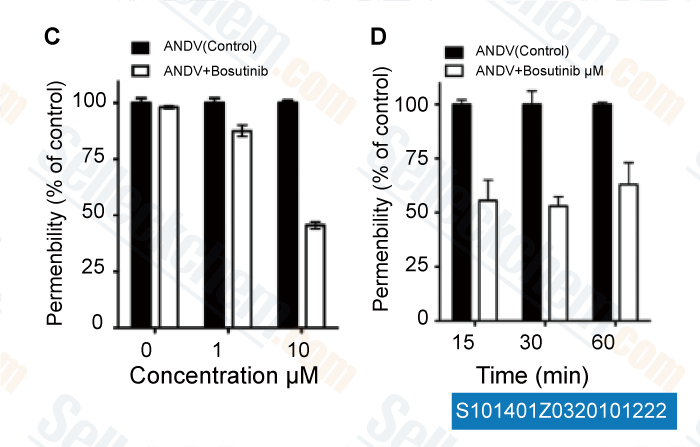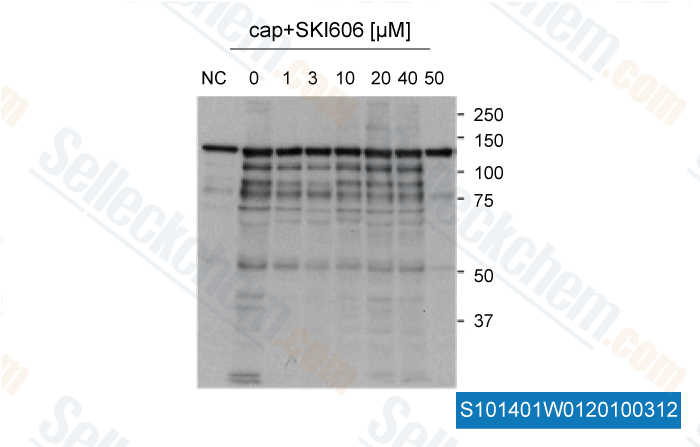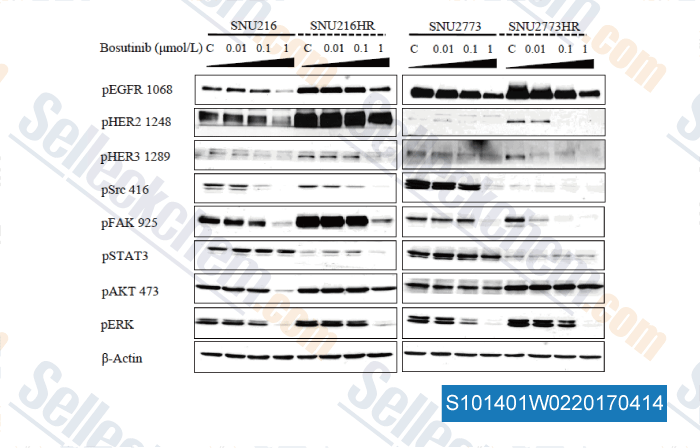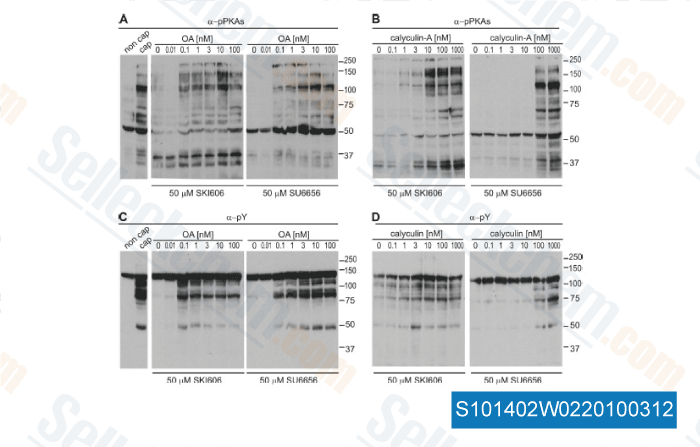|
Toll Free: (877) 796-6397 -- USA and Canada only -- |
Fax: +1-832-582-8590 Orders: +1-832-582-8158 |
Tech Support: +1-832-582-8158 Ext:3 Please provide your Order Number in the email. |
Technical Data
| Formula | C26H29Cl2N5O3 |
||||||||||
| Molecular Weight | 530.45 | CAS No. | 380843-75-4 | ||||||||
| Solubility (25°C)* | In vitro | DMSO | 100 mg/mL (188.51 mM) | ||||||||
| Ethanol | 16 mg/mL (30.16 mM) | ||||||||||
| Water | Insoluble | ||||||||||
| In vivo (Add solvents to the product individually and in order) |
|
||||||||||
|
* <1 mg/ml means slightly soluble or insoluble. * Please note that Selleck tests the solubility of all compounds in-house, and the actual solubility may differ slightly from published values. This is normal and is due to slight batch-to-batch variations. * Room temperature shipping (Stability testing shows this product can be shipped without any cooling measures.) |
|||||||||||
Preparing Stock Solutions
Biological Activity
| Description | Bosutinib is a novel, dual Src/Abl inhibitor with IC50 of 1.2 nM and 1 nM in cell-free assays, respectively. Bosutinib also effectively decreases the activity of PI3K/AKT/mTOR, MAPK/ERK and JAK/STAT3 signaling pathways by blocking the phosphorylation levels of p-ERK, p-S6, and p-STAT3. Bosutinib promotes autophagy. | |||||||||||
|---|---|---|---|---|---|---|---|---|---|---|---|---|
| Targets |
|
|||||||||||
| In vitro | Bosutinib is selective for Src over non-Src family kinases with an IC50 of 1.2 nM, and potently inhibits Src-dependent cell proliferation with an IC50 of 100 nM. [1] Bosutinib significantly inhibits the proliferation of Bcr-Abl-positive leukemia cell lines KU812, K562, and MEG-01 but not Molt-4, HL-60, Ramos, and other leukemia cell lines, with IC50 of 5 nM, 20 nM and 20 nM, respectively, more potently than that of STI-571. Similar to STI-571, Bosutinib displays antiproliferative activity against the Abl-MLV-transformed fibroblasts with IC50 of 90 nM. Bosutinib ablates tyrosine phosphorylation of Bcr-Abl and STAT5 in CML cells and of v-Abl expressed in fibroblasts at the concentration of ~50 nM, 10-25 nM and 200 nM, respectively, leading to the Bcr-Abl downstream signaling inhibition of Lyn/Hck phosphorylation. [2] Although unable to inhibit the proliferation and survival of breast cancer cells, Bosutinib significantly decreases the motility and invasion of breast cancer cells with IC50 of ~250 nM, involved with an increase in cell-to-cell adhesion and membrane localization of β-catenin. [3] |
|||||||||||
| In vivo | Bosutinib (60 mg/kg/day) is active against Src-transformed fibroblasts xenografts and HT29 xenografts in nude mice with T/C of 18% and 30%, respectively. [1] Oral administration of Bosutinib for 5 days significantly suppresses K562 tumor growth in mice in a dose-dependent manner, with the large tumors eradicated at dose of 100 mg/kg and tumor free at 150 mg/kg without overt toxicity. [2] As being inactive against Colo205 xenografts in nude mice at 50 mg/kg twice daily, Bosutinib dosing at 75 mg/kg twice daily is necessary against Colo205 xenografts, and increasing the dose of Bosutinib has no additional benefit, in contrast to the significant dose-dependent ability against HT29 xenografts. [4] |
Protocol (from reference)
| Kinase Assay: |
|
|---|---|
| Cell Assay: |
|
| Animal Study: |
|
References
Customer Product Validation

-
Data from [J Virol, 2011, 85, 2296–2303]

-
Data from [J Biol Chem, 2010, 285, 7977–7985]

-
, , Mol Cancer Ther, 2017, 16(6):1145-1154

-
, , Dr. Pablo E.Visconti from University of Massachusetts
Selleck's Bosutinib has been cited by 139 publications
| The molecular basis of Abelson kinase regulation by its αI-helix [ Elife, 2024, 12RP92324] | PubMed: 38588001 |
| Asciminib Maintains Antibody-Dependent Cellular Cytotoxicity against Leukemic Blasts [ Cancers (Basel), 2024, 16(7)1288] | PubMed: 38610966 |
| The E156K mutation in the CRYAA gene affects the epithelial-mesenchymal transition and migration of human lens epithelial cells [ Heliyon, 2024, 10(1):e23690] | PubMed: 38187316 |
| Multiplexed kinase interactome profiling quantifies cellular network activity and plasticity [ Mol Cell, 2023, 83(5):803-818.e8] | PubMed: 36736316 |
| Combination Therapies with CDK4/6 Inhibitors to Treat KRAS-Mutant Pancreatic Cancer [ Cancer Res, 2023, 83(1):141-157] | PubMed: 36346366 |
| Developing SHP2-based combination therapy for KRAS-amplified cancer [ JCI Insight, 2023, 8(3)e152714] | PubMed: 36752207 |
| FDA-approved Abl/EGFR/PDGFR kinase inhibitors show potent efficacy against pandemic and seasonal influenza A virus infections of human lung explants [ iScience, 2023, 26(4):106309] | PubMed: 36968089 |
| Tyrosine Kinase Inhibitor Profiling Using Multiple Forskolin-Responsive Reporter Cells [ Int J Mol Sci, 2023, 24(18)13863] | PubMed: 37762164 |
| Tyrosine Kinase Inhibitor Profiling Using Multiple Forskolin-Responsive Reporter Cells [ Int J Mol Sci, 2023, 10.3390/ijms241813863] | PubMed: 37762164 |
| THY1 (CD90) Maintains the Adherens Junctions in Nasopharyngeal Carcinoma via Inhibition of SRC Activation [ Cancers (Basel), 2023, 15(7)2189] | PubMed: 37046850 |
RETURN POLICY
Selleck Chemical’s Unconditional Return Policy ensures a smooth online shopping experience for our customers. If you are in any way unsatisfied with your purchase, you may return any item(s) within 7 days of receiving it. In the event of product quality issues, either protocol related or product related problems, you may return any item(s) within 365 days from the original purchase date. Please follow the instructions below when returning products.
SHIPPING AND STORAGE
Selleck products are transported at room temperature. If you receive the product at room temperature, please rest assured, the Selleck Quality Inspection Department has conducted experiments to verify that the normal temperature placement of one month will not affect the biological activity of powder products. After collecting, please store the product according to the requirements described in the datasheet. Most Selleck products are stable under the recommended conditions.
NOT FOR HUMAN, VETERINARY DIAGNOSTIC OR THERAPEUTIC USE.
